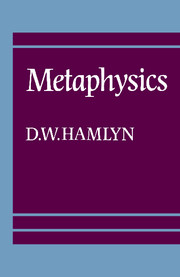Summary
What is metaphysics?
It is not easy to set out exactly what metaphysics is, and the whole question of what it is has often been thought problematic. From time to time it has even been doubted whether it really exists or is possible. The origins of the term ‘metaphysics’ are, however, clear enough. The word is the title of one of Aristotle's works, or rather it is the title that was given to a certain compilation of Aristotelian writings in the ancient world, probably in the library at Alexandria. The compilation was so called because it seemed to those responsible for it to consist of works coming after those on physics (meta taphusika). The title was in that sense a library classification. The correctness of the library classification would imply that there was at least a similarity of theme in those writings. It would not necessarily suggest that Aristotle himself had any conception of a distinct discipline, an autonomous branch of philosophy, the exposition of which was to be found there. Indeed, in the work that we now have under the title Metaphysics Aristotle discusses matters which have, to say the least, a considerable overlap with those discussed in the Physics and in other works of his.
It would be a mistake nevertheless to suggest that there is not in the Metaphysics discussion of issues which have a definite similarity to and continuity with those discussed by later philosophers under the same heading.
Information
- Type
- Chapter
- Information
- Metaphysics , pp. 1 - 10Publisher: Cambridge University PressPrint publication year: 1984
